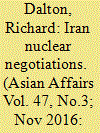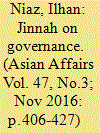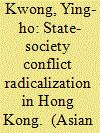|
|
|
Sort Order |
|
|
|
Items / Page
|
|
|
|
|
|
|
| Srl | Item |
| 1 |
ID:
148021


|
|
|
|
|
| Summary/Abstract |
In the imaginations of many, war in British India had its focus on the North-West Frontier and was fought against the tribes of that region. However, British thinking about Indian defence involving Afghanistan underwent tremendous change over the period under consideration. British plans to meet a Russian invasion on the Kabul-Kandahar Line in 1904 resembled those of any other Nineteenth Century Imperial campaign, with numbers of infantry and cavalry still being thought of and referred to as bayonets and sabres. Twenty years later, heavily influenced by the experiences of the Great War in the region and the Third Afghan War and associated operations, the calculus was different with logistics changed by motor vehicles and the introduction of what today are referred to as force multipliers, such as aeroplanes and machine guns. It was over this period that warfare as fought and conceptualised by men like Napoleon gave way to modern practices familiar to us today.
|
|
|
|
|
|
|
|
|
|
|
|
|
|
|
|
| 2 |
ID:
148025


|
|
|
|
|
| Summary/Abstract |
Film production has for a long time been a prominent medium for Palestinians to resist Israeli occupation and create a cultural memory. Though there are some academic studies on the subject, a critical framework of analysis for such films remains underdeveloped. This article argues that Palestinian film production has surged particularly in recent years as part of an increasingly globalised dimension to Palestinian resistance, alongside such initiatives as the Electronic Intifada and the BDS movement. Early Zionist rhetoric asserted the non-existence (or invisibility) of Palestinians. Several decades later, when the Arab revolt was shut down, the Israeli official propaganda largely shifted to a discourse of “emergency”, which decontextualizes the anti-colonial nature of Palestinian resistance. The films 5 Broken Cameras (2011) and Private (2004) both engage with Israeli colonialism and the state of emergency by acting as tools of witnessing, laying bare the occupational strategies the Israelis use under emergency law and revealing the arbitrary nature of such practices as the Separation Wall. The films challenge Israeli authority through their depictions of predominantly non-violent forms of resistance, which counters their historically constructed invisibility as a people, as well as the colonialist narrative of “terrorism”. Non-violent resistance makes the recognition of Israeli authority problematic, as the settlers cannot use brute force to drive out the Palestinians if there is no documented incident in context to justify violence. Furthermore, the article argues that the form of the films – pseudo-documentary and especially “talking witness” documentary – enables their emotive content to reach out to an international audience, which could potentially respond. Thus, the films not only contain acts of resistance, but they significantly are tools of resistance in the conflict.
|
|
|
|
|
|
|
|
|
|
|
|
|
|
|
|
| 3 |
ID:
148020


|
|
|
|
|
| Summary/Abstract |
This article, written by the former British Ambassador to Iran, starts with an overview from an insider's perspective of the 15 years of diplomacy leading up to the July 2015 Joint Comprehensive Plan of Action (JCPOA) regarding Iran's Nuclear capabilities. It discusses the merits of the plan and its prospects for the future. It examines the development of international economic engagement, and in particular argues that the western powers need to do far more to deliver an economic quid pro quo for Iran's nuclear concessions: if the situation is not appreciably better soon, it will be impossible for the US and its partners to argue credibly that they are not in breach of the JCPOA. The article concludes with a discussion of Iran's economic and political prospects in the light of the nuclear deal.
|
|
|
|
|
|
|
|
|
|
|
|
|
|
|
|
| 4 |
ID:
148023


|
|
|
|
|
| Summary/Abstract |
This paper examines the views of Pakistan's founder, Mohammad Ali Jinnah, on a range of issues including sovereignty, civil-military relations, the civil service, industrialization, religion and the state, and national integration. Relying on Jinnah's own views, it reveals that selective engagement with what Jinnah thought has done no favours to Pakistan. Indeed, Pakistan has for all practical purposes, rejected nearly every policy prescription that its founder believed in and effectively repudiated what Jinnah stood for. While much attention has been paid to Jinnah's role in the partition of India or in the politics of the Indian Freedom Movement and the Pakistan Movement, comparatively little has been written about Jinnah's views on governance. This paper tries to initiate the process of filling this gap in the hope of generating a more holistic debate about what Pakistan's founder stood for as a statesman and state builder.
|
|
|
|
|
|
|
|
|
|
|
|
|
|
|
|
| 5 |
ID:
148024


|
|
|
|
|
| Summary/Abstract |
Hong Kong has been facing an increasingly strong “anti-China” sentiment in recent years. More people are worried that existing Mainland-Hong Kong integration actually provides more opportunity for Beijing to exercise political control over Hong Kong, resulting in the loss of local identity. Political parties of the pan-democratic camp, which has been at the forefront of political activism since the 1980s, used to adopt a “milder” approach to oppose intervention from Beijing. However, with more Hong Kong people, especially localists, becoming sceptical towards this tactic, they have resorted to escalating things into “radical” protests or even bloody clashes with the authorities. During Chinese Lunar New Year 2016, a few hundred protesters joined the “Mong Kok Riot” and violently pelted police officers with bricks and glass, leading to more than 120 people being injured. The clashes may on the surface have been about hawker management issues, but, in fact, were fuelled by a growing discontent against the Chinese and Hong Kong Special Administrative Region governments. With more protesters prepared to take more radical actions against the authorities, state-society relations in Hong Kong are likely to enter an unprecedented period of tension.
|
|
|
|
|
|
|
|
|
|
|
|
|
|
|
|
| 6 |
ID:
148022


|
|
|
|
|
| Summary/Abstract |
Terrorism and violent extremism are usually the top national security risks amongst the five Central Asian states. Although each state has its own approach to countering violent extremism and terrorism, they tend to broadly agree on the nature of the threat. Their definitions of “terrorism” and “extremism” are relatively broad in both legal definition and in practice, and they are often geared towards protecting the political and social status quo. A key challenge is that both religion and religiously-inclined, usually Islamic, groups have become blanket tools of blame to cover a range of actions and the perceived threat of actions deemed “terrorist” and “extremist”.
|
|
|
|
|
|
|
|
|
|
|
|
|
|
|
|
| 7 |
ID:
148026


|
|
|
|
|
| Summary/Abstract |
This essay analyses the foundations and future of the Vietnam-US partnership. It shows that Vietnam and the United States have sought to broaden and deepen the bilateral relations in three main areas: (i) trade and investment relations, (ii) political and security relations, and (iii) people-to-people cooperation. These areas continue to be the pillars for Vietnam and the United States to build up their ties. Given China's growing assertiveness in the South China Sea and the United States rebalance to the Asia-Pacific, Vietnam and the United States will become closer and will work together to add strategic values to their partnership.
|
|
|
|
|
|
|
|
|
|
|
|
|
|
|
|
|
|
|
|
|